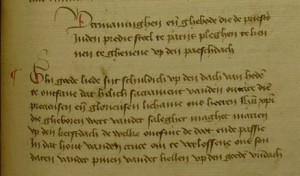Geraardsbergen Manuscript, text 76 (fols. 142r-144v)
Unlike today when Roman Catholics can receive the holy communion weekly during mass on Sunday, in the Middle Ages one could only receive it once or twice each year on the most important christian celebrations: Christmas and especially Easter.
But it took a brave (wo)man to receive it!
‘I forbid anyone to receive Our Lord (i.e. the Holy Communion) – on punishment with excommunication – in this church or parish unless he has confessed his sins to me, or to anyone appointed by me to take confession, or anyone who has the power to take confession,’ thunders the priest. And that was not all! You could get excommunicated too, if you tried to receive the communion when you hated someone, or had committed a deadly sin. People who only come into the church to receive the communion are warned too: you should not rush out of church after receiving the host to start excessive eating and drinking as soon as possible.Confession was a key word in medieval christianity. By confessing your sins to a priest, you could be forgiven for them. But only after you had done penance for your sins you were considered to be ‘clean’ enough again to receive the holy communion.
Can this be a sermon by the Parisian John Gerson? It could be possible. Both text 77 and text 73 are attributed to him in the headings (?) above the text, and their topics are closely connected: what to confess (73), when you are allowed the holy communion (76) and how to die in a state of grace (77).
Go to: Table of contents

